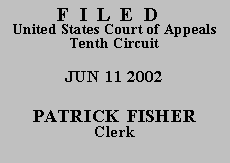

| WAYNE ALGENSTEDT,
v.
RONALD J. CHAMPION, sued as
Warden Champion or Ma Haffee |
|
Background
In 1989, Mr. Algenstedt pleaded nolo contendere in Oklahoma district court to two counts of Rape by Instrumentation, First Degree Rape, Sodomy, Attempted Rape, and Lewd Molestation, all after prior conviction of a felony. The court sentenced him to thirty years imprisonment with the sentences to run concurrently. Sometime prior to February 23, 1997, Mr. Algenstedt inquired to the Oklahoma Department of Corrections ("DOC") regarding incorrect calculation of his earned credits. The DOC rejected Mr. Algenstedt's request for additional credits because he failed to provide adequate information for the DOC to make any determinations. R. Doc. 7, Ex. C.
Mr. Algenstedt then filed a state habeas petition which the Oklahoma district court denied for failure to effect service of process. Mr. Algenstedt then proceeded with various petitions for habeas and mandamus to both the Oklahoma Court of Criminal Appeals ("OCCA") and the Oklahoma Supreme Court. The Oklahoma Supreme Court referred Mr. Algenstedt's petitions to the OCCA, which declined jurisdiction because the district court had never denied relief to Mr. Algenstedt but had only refused to consider his petition for lack of service of process. R. Doc. 7, Ex. I.
On February 14, 2000, Mr. Algenstedt filed a pro se federal habeas petition pursuant to 28 U.S.C. § 2254 claiming the incorrect calculation of his earned credits deprived him of his constitutional rights. The district court, viewing Mr. Algenstedt's petition as one challenging the execution of his sentence, construed the petition as one filed pursuant to 28 U.S.C. § 2241. The district court then concluded that Mr. Algenstedt's filing of his petition after April 24, 1997 constituted an untimely filing due to the one-year limitation under 28 U.S.C. § 2244(d) and therefore dismissed the petition.
Discussion
On appeal, and represented by counsel, Mr. Algenstedt asserts that although a § 2241 petition is governed by § 2244(d)'s one-year limitation, his one-year limitation did not begin to run until he was able to bring his cause of action in Oklahoma. In Ekstrand v. Oklahoma, 791 P.2d 92 (Okla. Crim. App. 1990), the OCCA held that inmates who seek a correction to the calculation of their earned credits could only do so when such credits were adequate to entitle the inmate to immediate release. Id. at 95. But see Canady v. Reynolds, 880 P.2d 391, 396 (Okla. Crim. App. 1994) (allowing inmates to use writ of mandamus to force prison officials to restore revoked credits before eligibility for release). Thus, Mr. Algenstedt argues that the one-year limitation under § 2244(d) did not begin in his case until sometime in 1999 when his avenue for state relief became available.
The relevant statutory measuring event for the one-year limitation in this case is "the date on which the factual predicate of the claim . . . presented could have been discovered through the exercise of due diligence." 28 U.S.C. § 2244(d)(1)(D). Oklahoma requires that inmates receive a monthly accounting of sentence credits, Okla. Stat. tit. 57, § 138(G)(2), and Mr. Algenstedt did not dispute below, nor does he here, that he received his monthly accountings throughout his incarceration. As a result, he must have been aware of how the DOC was calculating his credits well before April 24, 1996, the effective date of § 2244(d)'s one-year limitation. The district court was therefore correct in concluding that Mr. Algenstedt should have filed his federal habeas petition by April 24, 1997. See United States v. Simmonds, 111 F.3d 737, 746 (10th Cir. 1997) (one-year limitation begins on April 24, 1996 for those convicted prior to the enactment of § 2244(d)).
The statutory language of § 2244(d) simply does not provide for beginning the one-year limitation on the date a state remedy became available. See Preston v. Gibson, 234 F.3d 1118, 1120 (10th Cir. 2000) (rejecting contention that the one-year limitation began to run only after the OCCA handed down two decisions). Although, as Mr. Algenstedt notes, we stated in Miller v. Marr, 141 F.3d 976, 978 (10th Cir. 1998), that "[t]he one-year time period begins to run in accordance with individual circumstances that could reasonably affect the availability of the remedy," we stated further that § 2244 nonetheless "requires inmates to diligently pursue [their] claims." Id. Given Mr. Algenstedt's knowledge of his incorrect credit calculations, and that we have waived the exhaustion requirement under the same circumstances that he claims prevented him from filing his federal habeas petition in a timely manner, see Wallace v. Cody, 951 F.2d 1170, 1172 (10th Cir. 1991), we see no reason to deviate from § 2244(d)'s statutory command.
AFFIRMED.
Entered for the Court
Paul J. Kelly, Jr.
Circuit Judge
*. This order and judgment is not binding precedent, except under the doctrines of law of the case, res judicata, and collateral estoppel. This court generally disfavors the citation of orders and judgments; nevertheless, an order and judgment may be cited under the terms and conditions of 10th Cir. R. 36.3.
2.After examining the briefs and the appellate record, this three-judge panel has determined unanimously that oral argument would not be of material assistance in the determination of this appeal. See Fed. R. App. P. 34(a); 10th Cir. R. 34.1 (G). The cause is therefore ordered submitted without oral argument.